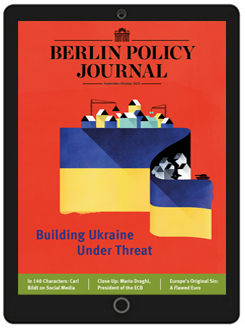Berlin Policy Journal
International affairs from the heart of Europe

International affairs from the heart of Europe

Ukraine has made significant headway reforming its economy since the revolution. But quite a bit remains to be done, and the short-term outlook is grim.
A kleptocratic regime, mighty oligarchs – Ukraine was an economic mess before the revolution. Ricardo Giucci and Robert Kirchner, who advise the Ukrainian government, discuss Ukraine’s to-do list.
Berlin is more deeply engaged in solving the situation in eastern Ukraine than ever before in an international conflict. State Secretary of the German Foreign Office Markus Ederer on the attempts to make “Minsk” work.
A project to memorialize five Holocaust mass grave sites in western Ukraine is helping pave the road to democracy and reexamine the country’s troubled past.
The president of the European Central Bank has a tough balancing act to pull off – do too little and the common currency will fall apart; too much, and European policy-makers won’t take steps necessary to strengthen it.
Twenty-five years after German reunification, the European Union is struggling to come to terms with the consequences of that profound shift – as is Germany itself.
Berlin has been vilified for its handling of Greece, but 2015 has actually been a banner year for German diplomacy: de-escalating the crisis in Ukraine, finding agreement over Iran’s nuclear program, and avoiding a Grexit.
Without TTIP Europe’s competitiveness in the global market is in danger, especially in light of the TPP agreement the US is negotiating with Asia.
Think that a “Merkel doctrine” is an oxymoron? Wrong: Ertüchtigung – loosely, “help for self help” – sounds outdated even to German ears, but the concept behind it is useful today.
The Greek rescue package has postponed Europe’s reckoning, but one thing is clear: the euro lacks a supporting foundation.
The EU is experiencing the worst storm since its inception, says Norbert Röttgen, chair of the German Bundestag’s foreign affairs committee.
Long overdue, the EU has started strategic reflections on what its global strategy could look like.
Sweden’s former PM and foreign minister on being undiplomatic on Twitter.
The notion of “European solidarity” cuts many ways; right now, it needs to be applied to the EU’s two most pressing problems, Greece and refugees.
Nothing embodies the growing distance between Greece and the 18 other eurozone members like the personal relationship between Angela Merkel and Alexis Tsipras: a drama in three acts.
The fallout with Greece has shown the complexity of governing the eurozone. The time to address the euro’s weaknesses and keep Europe’s single currency credible is now.

